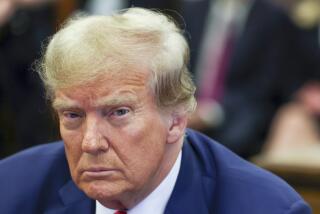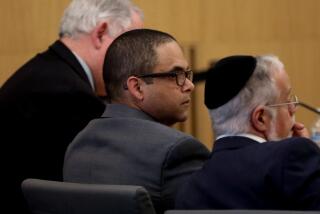Defense rests in George Zimmerman trial
- Share via
SANFORD, Fla. — George Zimmerman told Judge Debra S. Nelson that he didn’t want to take the stand in his murder trial, and his defense promptly rested its case Wednesday, preparing the way for a jury of six women to begin deliberations on whether the neighborhood watch volunteer murdered Trayvon Martin or shot the teenager in self-defense.
A month after jury selection began, the case that galvanized civil rights demonstrations across the nation will move to closing arguments when jurors return at 1 p.m. on Thursday and deliberations will begin Friday, the judge said in court after discussing the schedule with both sides.
Zimmerman, 29, is charged with second-degree murder in the shooting of Martin, 17, on Feb. 26, 2012, at the Retreat at Twin Lakes, a gated community in Sanford. Zimmerman has maintained that he shot Martin, who was black, in self-defense when the unarmed teenager attacked him.
Local police did not charge Zimmerman, who identifies himself as a Latino. After weeks of demonstrations, a special prosecutor was appointed; she filed the murder charge. The prosecution maintains that Zimmerman profiled the teenager, followed him against police advice, leading to the shooting.
Whether Zimmerman would testify has been one of the mysteries in the proceedings. Having him take the stand would have allowed him to try to reconcile the different versions of events he has given, but it would have opened him up to what would have been a withering cross-examination that could have damaged the credibility that the defense, through witnesses and sharp cross-examination of prosecution witnesses, had developed.
Nelson asked Zimmerman whether he had made a decision on whether to testify, and the defendant said he had. After consulting with his lawyers, Zimmerman said that he would not take the stand. Earlier, Nelson got into a testy exchange with defense lawyer Don West about asking Zimmerman whether he would testify.
Nelson has been the guardian of the jury, whose members are sequestered in a hotel, cut off from family and friends. Relations in the courtroom have frayed during the proceedings. After a 13-hour day Tuesday, West complained that the pace was grueling. As he complained, Nelson gathered up her papers and walked out of the courtroom.
On Wednesday morning, Nelson ruled against the defense and decided to keep from being entered as evidence an animation of the defense’s theory of what happened that night, though she said she would allow it to be used during closing arguments. She also ruled against allowing text messages that the defense maintains were Martin’s. The messages show that Martin was interested in fighting, the defense said.
“To have an animation go back into the jury room that they can play over and over again gives a certain weight to something that this court isn’t exactly certain comports with the evidence presented at trial,” Nelson said.
After hours of arguments, Nelson said that just because the text messages on fighting had come from a phone used by Martin — but whose account is not in Martin’s name — there was no way to prove the teenager had written them.
“People have children who pick up their phones and play with them,” she told a clearly infuriated West. “I don’t have any identifying marks that these text messages are created by or sent by Mr. Martin.”
The defense took fewer than four full days to present its case, which included fewer than 20 witnesses, some of whom also testified for the prosecution. The prosecution, which has the burden of proving that Zimmerman committed second-degree murder, put on about three dozen witnesses and took nine days.
Much of Wednesday was taken up by the testimony of Dennis Root, a safety consultant. Root testified that Martin was in better physical shape than Zimmerman, and that the neighborhood watch volunteer wasn’t an athlete. The testimony echoed a similar assessment on Tuesday by the owner of the gym where Zimmerman trained.
During cross-examination, the prosecution brought out its own audio-visual aid, a life-sized, pliable foam dummy that was used to simulate different sets of positions between Zimmerman and Martin. Straddling the dummy, prosecutor John Guy asked Root whether it was possible that Martin was backing away from Zimmerman at the time of the fatal gunshot.
“Yes,” Root said.
Defense attorney Mark O’Mara battered the dummy as he challenged the theory that Martin was retreating. Root eventually said he had no specific information to determine Martin’s position.
The defense’s last witness was Robert Zimmerman Sr., George’s father, who testified that the voice heard screaming in the background of a 911 emergency tape was that of his son.
The screams are another one of the case’s unresolved conflicts. Relatives, friends and co-workers of Zimmerman have testified the voice is his, and relatives of the Martin family have testified it is Trayvon Martin calling for help on the recording.
Susman reported from Sanford, Fla., and Muskal from Los Angeles.
More to Read
Sign up for Essential California
The most important California stories and recommendations in your inbox every morning.
You may occasionally receive promotional content from the Los Angeles Times.















